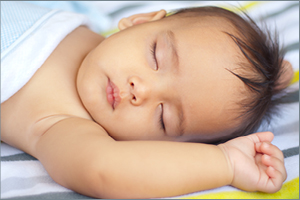
This summer, my family is headed to an older cabin with no air-conditioning for two weeks. My kids don’t sleep well when it’s too hot. I’m worried we’ll be sleepless the entire vacation. Help!
You’re wise to plan ahead. Summertime heat is notorious for ruining rest, cueing choruses of “I can’t sleep!” and making kids (and parents) sweaty, sleepless and miserable.
Sweltering temps make it hard to nod off because the body naturally cools to initiate and maintain deep sleep. A too-warm bedroom thwarts this process, so it’s difficult to fall asleep and maintain a deep, restful slumber. Sleeping too hot is linked to night wakings and nightmares, and increases the risk of Sudden Infant Death Syndrome (SIDS).
A temperature of 68 to 72 degrees Fahrenheit is ideal for sleep. But during sun-soaked summer evenings, it’s not uncommon for bedrooms to turn into mini-saunas with temperatures upwards of 85 degrees. Give your kids a great chance at a good night’s sleep with these tips:
- For a cool bedroom retreat, put sheets and pillowcases in the freezer during the day. At bedtime, pull out icy-cold linens for a cool, comfortable bed.
- Bring along portable fans (make sure they are child-safe) to cool bedrooms before sleep. Small clip-on fans are light and packable, and can be attached to a bedframe for nighttime cooling.
- Have kids bathe or shower before bed to jump-start the cooling process that brings on the Sandman. On scorching evenings, send children to bed with damp hair, or lightly mist heads and necks with a spray bottle filled with cool water before tuck-in.
- Take note of the hour when the outdoor temperature peaks and begins to fall. In many areas, it happens around 6 p.m. Afterward, the air inside is often warmer than the air outside, making this a great time to open the windows to create a breeze, and use fans to blow the cooler air in (and the stuffy indoor air, out).
- Stash a spill-proof water bottle or sippy cup filled with ice cubes near a child’s bed. During the night, the ice will melt into a cooling sip of water.
- Finally, ensure that children aren’t cooling down by gulping drinks containing caffeine, a dehydrating diuretic that makes sleep even more difficult.
My kids, ages 5 and 8, get up around 7 a.m. during the school year. But during the summer, we let them sleep in until 9, sometimes later. Is there any harm in this?
As adults, we sometimes crave an extra hour or two in bed in the morning, and children are no different. During the summer, snoozing late can help children make up for sleep lost to late bedtimes, sleepovers, summer camps, and other summer adventures that can tire kids out. But there are a few caveats.
First, kids who sleep later in the mornings will stay up later at night (so your easy 8 p.m. bedtimes will be no-gos). If your children do best with an earlier bedtime, you may want to consider maintaining the 7 a.m. wake-up time during the week, and allow “sleeping in” for an extra hour or so only on weekends.
If your children will need to wake early once school starts, you should consider transitioning back to an earlier wake-up time two weeks before the first day of school, so they’ll be bright-eyed and ready to learn when that first morning bell rings.
Finally, sleeping late means that children miss out on quiet, calm summer mornings before all the hustle, bustle and heat set in — sometimes, the best part of a summer day!
Editor’s note: This article was originally published in July 2018, and updated in August 2019.
|












